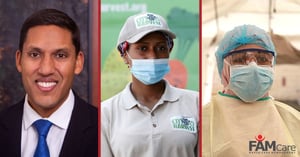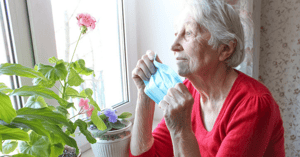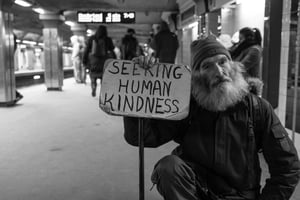With the third virulent spike of the COVID-19 pandemic descending on the world, social workers are taking a pro-active, creative look at how they can be of service to the most vulnerable. They sit in a unique position during a public health crisis, one that’s often overlooked. From offering emotional and mental health support to educating the larger community, their role entails navigating what is often a complex and evolving situation.
COVID SPIKES FOR THE THIRD TIME...What Social Workers Can Do
Topics: social workers, Covid-19/Pandemic
Nonprofits Going the Extra Mile To Help Defeat Covid-19
Sometimes this blog can do nothing more than report the devotion to service demonstrated by social service agencies and nonprofits across the country. Four nonprofits reached far outside their comfort zone to help mitigate the devastating effects of COVID-19. Here are their stories.
Topics: Nonprofit General, grants, Covid-19/Pandemic
A United Nations policy brief just published outlines the unique vulnerability of women across the globe to this COVID-19 pandemic.
UN Policy Brief – Summary of Findings
- The pandemic is deepening pre-existing inequalities, exposing vulnerabilities in social, political and economic systems which are in turn amplifying the impacts of the pandemic.
- Compounded economic impacts are felt especially by women and girls who are generally earning less, saving less, and holding insecure jobs or living close to poverty.
- Unpaid care work has increased, with children out-of-school, heightened care needs of older persons, and overwhelmed health services.
- As the COVID-19 pandemic deepens economic and social stress coupled with restricted movement and social isolation measures, gender-based violence is increasing exponentially.
Topics: social issues, Covid-19/Pandemic
Only social workers who deal with childhood hunger every day realize how devastating the COVID-19 pandemic has been for millions of everyday school children who attend school with your children and mine. For many of your children’s classmates, not attending in-person school has meant missing 5 essential meals a week and, in many cases, the bulk of their nutrition.
Topics: Homeless & Food Pantry, education, what social workers do, Covid-19/Pandemic
While singing the praises of our dedicated case workers during the coronavirus pandemic, I have received numerous inquiries from readers who do not know what case workers do in hospital and post-care settings. Apparently, the critical role of medical social workers is not clear to the general public. I thought it best, therefore, to let them speak for themselves.
Topics: Elderly/Aging Long Term Care, caseworkers, Covid-19/Pandemic
Adults 65 and older account for 16% of the US population but 80% of COVID-19 deaths. Even as most states begin to gradually reopen society to restart a stalled economy, the message to the elderly is “NOT YOU”. You best - “STAY HOME” – “ISOLATE” - “QUARANTINE” while the rest of society risks illness trying to get on with life.
Social workers who work with the elderly are concerned. They say that during times of crisis, mental health cannot be overlooked. Loneliness and social isolation for older adults have a deep, emotional impact, sometimes leading to social disorders such as depression and anxiety. Social isolation has also been linked to increases in emergency department visits, hospitalizations, and nursing home placements.
Topics: Elderly/Aging Long Term Care, mental health, social workers, Covid-19/Pandemic
Unsung Heroes
“Latino and African-American residents of the United States have been three times as likely to become infected as their white neighbors, according to new CDC data, which provides detailed characteristics of 640,000 infections detected in nearly 1,000 U.S. counties,” the Times reports. “And Black and Latino people have been nearly twice as likely to die from the virus as white people.”
Topics: Covid-19/Pandemic
Social Workers Support Physicians During COVID Mental Health Crisis
Social workers tell us that primary care providers are inundated with patients seeking help with psychic symptoms that require the attention of a psychiatric specialist. Family physicians and emergency room doctors often do not feel qualified to deal with this new mental health crisis and need the help of social workers to execute a referral process while helping patients feel more comfortable going to a new and unfamiliar physician.
Topics: mental health, social workers, what social workers do, Covid-19/Pandemic
Caseworkers who serve the homeless population have been working overtime during the covid pandemic.
HOMELESSNESS UPDATE: Time, July 22, 2020, Belinda Luscombe
Homelessness has recently been getting worse, with a 3% increase in the number of homeless people just in the past year. But, says Nan Roman, head of the National Alliance to End Homelessness, “there’s never been anything like this.” One Columbia University analysis of unemployment figures suggested that by the end of 2020, homelessness would increase by 40%. In July, about 44.5 million Americans told the Household Pulse Survey takers at the Census Bureau that they either hadn’t made last month’s mortgage or rent payment on time or doubted they could make the next one. Unless Congress acts, the moratorium on evicting people from most federally subsidized housing will run out at the end of July. “Starting on July 25, 2020, landlords must give 30-day notice before pursuing eviction for nonpayment between March 27, 2020, and July 24, 2020,” says a HUD official. The Aspen Institute estimates that by October, 1 in 5 American renters could face eviction.
Topics: Homeless & Food Pantry, social workers, Covid-19/Pandemic
Present Appearances
With the onset of the corona virus pandemic and the issuance of “stay at home” orders closing schools and businesses in many local communities, child abuse reports have plummeted across the country. The agencies, which provide support for families and children as abuse cases move through the justice system, reported serving 40,000 fewer children nationwide between January and June of this year than the same period last year, from 192,367 children in 2019 down to 152,016 this year, a 21% drop, according to the National Children’s Alliance, an accrediting body for a network of 900 children’s advocacy centers. Reports of abuse have declined dramatically, they say, not because it isn’t happening, but because with everyone “sheltering in place”, teachers, doctors and others have fewer ways of catching it.











